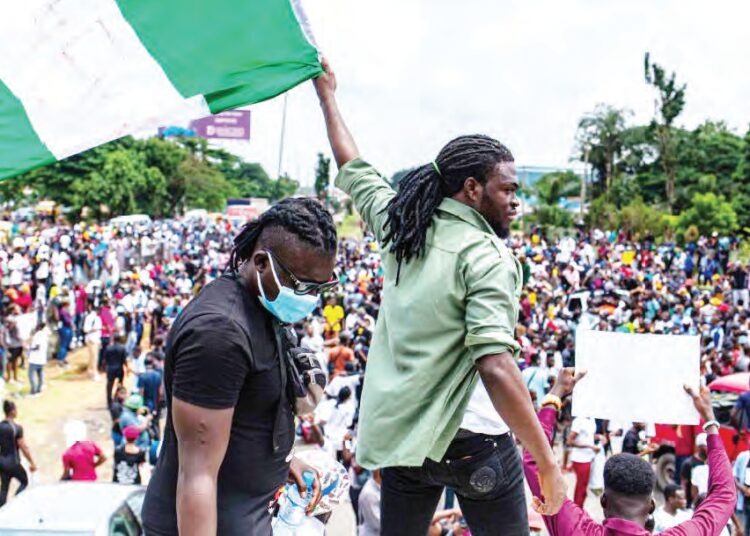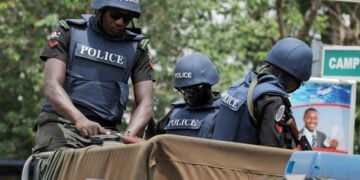In every functioning democracy, the right to protest is sacrosanct—an essential component of civic life that allows citizens to express grievances, demand accountability, and influence change. This right is enshrined in the Nigerian Constitution, yet the experiences of Nigerian protesters paint a bleak picture. When they engage in peaceful demonstrations, Nigerian security agencies—particularly the police—too often respond with brute force, intimidation, and unlawful arrests. This troubling trend stands in stark contrast to how similar protests have been handled in other democracies like the United States, the United Kingdom, and Israel, among others.
Section 40 of the 1999 Constitution of the Federal Republic of Nigeria (as amended) guarantees the right of every citizen to “assemble freely and associate with other persons”. Additionally, Article 11 of the African Charter on Human and Peoples’ Rights, which Nigeria has ratified, reinforces the right to peaceful assembly. Despite these clear protections, Nigerian authorities repeatedly violate these provisions under the guise of “maintaining public order.”
The EndSARS movement of 2020 is a typical example. Thousands of Nigerian youths took to the streets to demand an end to police brutality, particularly by the now-disbanded Special Anti-Robbery Squad (SARS), and better remuneration for the police, among other public interest demands. The response was not dialogue or reform, but tear gas, baton charges, and, tragically, live ammunition—culminating in the Lekki
Toll Gate shooting on October 20, 2020, where security forces reportedly fired upon peaceful protesters. To this day, no high-ranking official has been held accountable. Although the government denied that any protesters died, the controversy surrounding that incident remains fresh in the minds of the public.
The outcry that followed led to dismantling the dreaded Special Anti-Robbery Squad (SARS), whose highhandedness triggered the protest. However, any Nigerian who believed the security agencies would change their approach to peaceful protests would be disappointed by what has happened since. Last year, when some Nigerians tried to demonstrate against the economic hardship in the country, many, including minors, were arrested, locked up for months, and charged with treason. It took national outrage for the government to retreat, drop the charges, and release them.
The recent protest by the Take-it-Back Movement, led by Mr Omoyele Sowore, was similarly quashed with a heavy hand. The police fired teargas canisters and even arrested those peacefully exercising their democratic and civic rights.
Ironically, when some persons and groups hold public demonstrations in support of the government, they are not encumbered in any way by security agents. A more worrying trend is when, ostensibly, sponsored pro-government demonstrators launch violent attacks on anti-government protesters in the presence of policemen, with nothing done to check the hooligans. All these actions give the impression that the government is intolerant of any voice of dissent.
This is unlike the Jonathan administration, which allowed Nigerians to exercise their rights to protest against government policies they were uncomfortable with. The incumbent president, Ahmed Bola Tinubu, is known to have played a significant role in the anti-subsidy removal protest of 2012, tagged ‘Occupy Nigeria’, which lasted one week and five days and disrupted socio-economic activities in Lagos and across Nigeria. The BringBackOurGirls (BBOG) Movement, led by former minister Dr Oby Ezekwesili and others, staged their protest for nearly two years to pressure the then government into rescuing the
Chibok schoolgirls, yet they were not dispersed with force.
The recent mass street demonstrations against President Donald Trump’s policies involved millions of American citizens protesting across 1,000 cities in 50 US states, yet not a single bullet or teargas canister was fired at them.
In Israel, the 2023 protests against Netanyahu’s judiciary reforms lasted nine months and five days, with police using minimal force and ensuring the demonstrators’ rights were respected.
So, why do Nigerian governments repeatedly treat peaceful protests with hostility and brutality? Part of the answer lies in the deeply rooted culture of impunity. Rather than seeing the public as citizens to serve, the police often perceive demonstrators as enemies of the state. The chain of command prioritises “order” over rights, often interpreting any mass mobilisation as a threat to national security.
This attitude is dangerous—not just to human rights but to democracy itself. When citizens are afraid to express themselves publicly, governance becomes detached from the people’s needs and voices. Suppressing protests stifles civic participation and increases the risk of violent outbursts as frustration festers without an outlet.
This anti-protest attitude undermines Nigeria’s democracy and need not continue. To safeguard democracy, Nigeria must undergo a multi-pronged reform effort.
First, the Nigeria Police Force needs urgent retraining, focusing on human rights, crowd control, and de-escalation tactics. Officers must be taught that protesters are not enemies but citizens exercising constitutional rights. Second, an accountability mechanism must be in place to enforce strict legal consequences for officers who engage in unlawful use of force. Independent oversight bodies, such as the Police Service Commission and the National Human Rights Commission, should be empowered to investigate and prosecute misconduct swiftly.
Democracy is not defined solely by the ability to vote but by the continuous engagement of citizens with their government. Peaceful protest is a pillar of that engagement.
As a newspaper, we urge the Tinubu administration to embrace the fact that dissent is not a threat but a sign of a vibrant democracy, which must be nurtured to grow under its watch. not retrogress.





